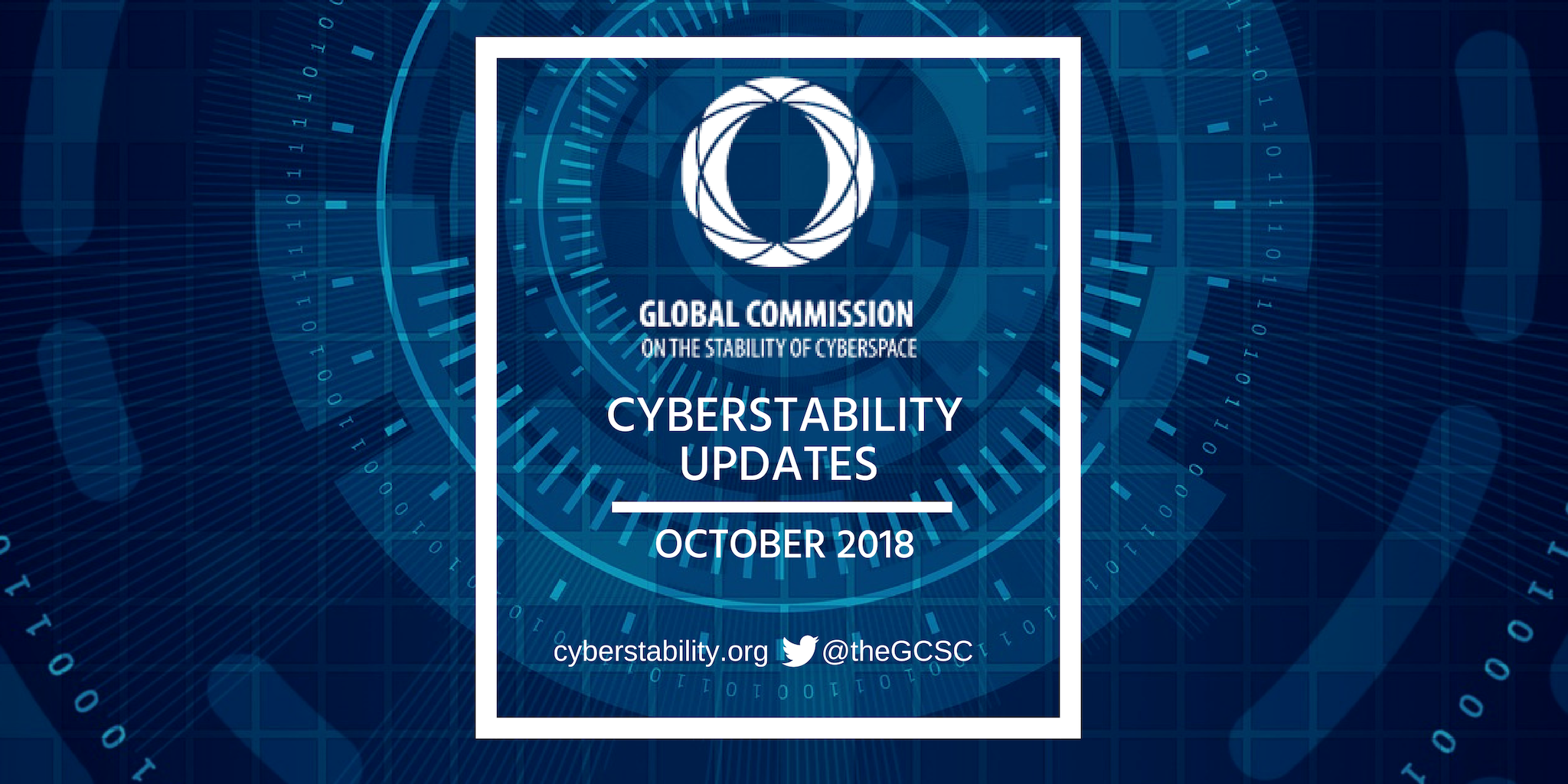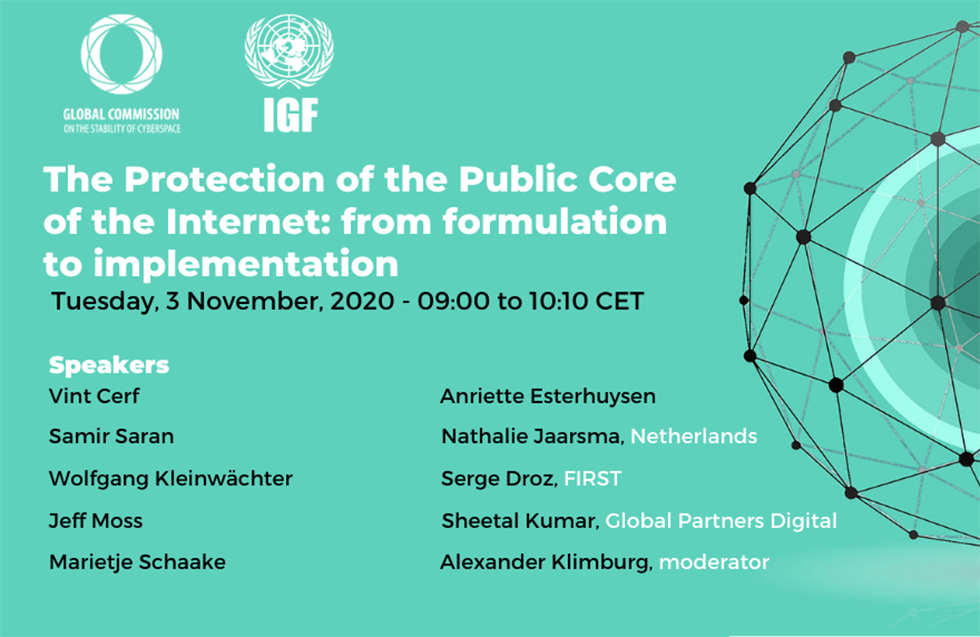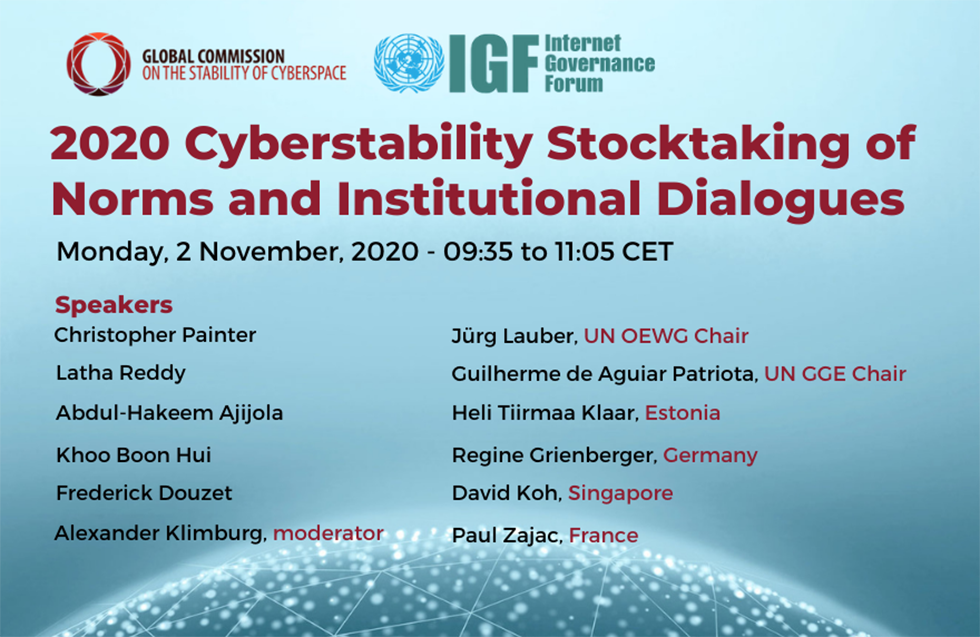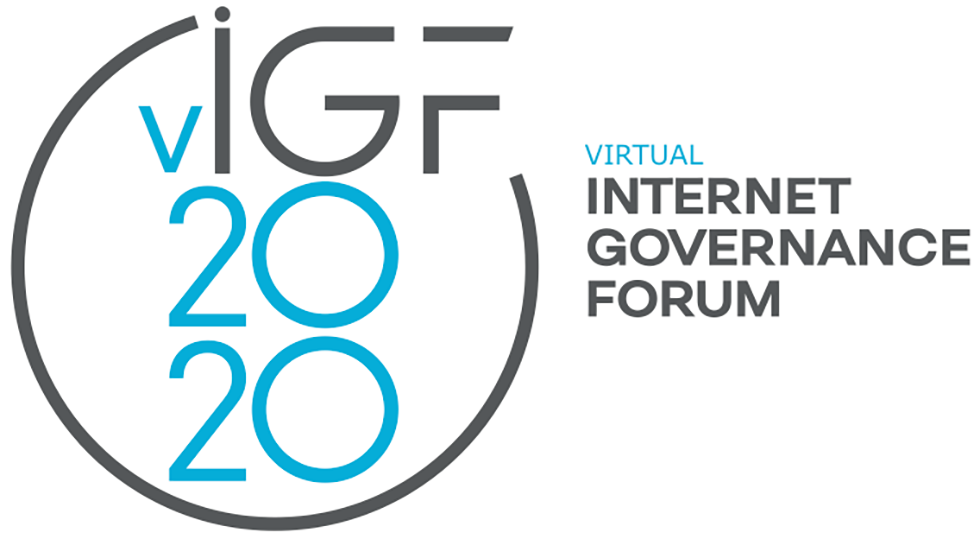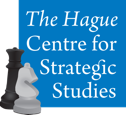Sign up to the weekly newsletter!
This Cyberstability Update is an overview of all articles included in our Weekly Newsletters for the month. Want to receive these updates on a weekly basis? Sign up here to receive our weekly newsletter on the work of the Global Commission on the Stability of Cyberspace (GCSC), its members and developments in the field of international cyber policy.
Russian GRU Activity Raises Questions on Responsible Actions in Cyberspace
The week of 5th October marked an important moment for cyberdiplomacy and norm-building of acceptable state behavior in cyberspace, with several states attributing cyberattacks that undermine the international rules based order. The important question is what can and should we do in the longer term to improve our resilience against potential adversaries and how to discourage future malicious cyber activities.
Western countries issued coordinated denunciations of Russia on Thursday for running what they described as computer hacking programs to undermine democracies, targeting institutions from sports anti-doping bodies to the chemical weapons watchdog.
Authorities from the Netherlands arrested and deported four Russian individuals they claim were trying to hack into the OPCW in The Hague. In some of the strongest language aimed at Moscow since the Cold War, Britain said Russia had become a “pariah state”. The United States said Moscow must be made to pay the price for its actions. And their allies around the world issued stark assessments of what they described as a campaign of hacking by Russia’s GRU military intelligence agency.
The Dutch Military Intelligence and Security Service (MIVD) and the United Kingdom’s Ministry of Justice disclosed the identities of four Russian individuals, believed to be officers of the cyber-warfare division of the Russia’s Main Directorate of the General Staff of the Armed Forces (GRU). Evidence against the individuals was laid out by the MIVD in a presentation yesterday.
Bellingcat and its Russian investigative partner, The Insider, attempted to verify that the identities disclosed by the Dutch authorities were in fact the authentic identities of the persons involved. They uncovered car registrations linked to 305 individuals, revealing their personal data and indicating affiliation to GRU military unit 26165, potentially pointing to a massive security breach at the organization.
The developments add to announcements made back in January that link intel obtained by Dutch intelligence services to Russian involvement in the US elections. The US Department of Justice, for their part, charged a further 7 Russian GRU officers with “international hacking and related influence and disinformation operations.”
Separately, the British government has directly accused Russian military intelligence of being behind a spate of “reckless and indiscriminate cyber-attacks” carried out on the orders of Vladimir Putin’s Kremlin, including the hacking in 2016 of the US Democratic National Committee headquarters. Other countries have expressed support for the U.K., U.S. and Dutch governments. Estonian Foreign Minister Sven Mikser confirmed this. In a statement he said:
“Today we have seen confirmations of serious instances of trying to undermine stability in cyberspace. Cyber attacks against international institutions, democratic elections and civilian critical infrastructure decrease stability in cyberspace and undermine the rules-based international order. Cyber attacks pose a risk for resilience and integrity of the digital domain, on which our economies and societies depend. Such attacks disrespect the norms of responsible state behavior and violate international law.”
The GCSC in the News
How to Exercise the Power you Didn’t Ask For
The article by Commissioner Jonathan Zittrain was published in Harvard Business Review, 19th September 2018
The digital surveillance economy has ballooned in size and sophistication, while keeping most of its day-to-day tracking apparatus out of view. Public reaction has ranged from muted to deeply concerned, with a good portion of those in the concerned camp feeling so overwhelmed by the pervasiveness of their privacy loss that they’re more or less reconciled to it. It’s long past time not only to worry but to act.
As platforms provide highly curated and often single responses to consumers’ queries, they’re likely to face heated questions — and perhaps regulatory scrutiny — about whom they’re favoring or disfavoring. So what should mediating platforms do?
Netherlands Internet Governance Forum 2018
Commissioner Wolfgang Kleinwächter was a speaker at the NL IGF on 11th October. The title of his address was The New Internet Governance Complexity: How to prepare for a safe, free and unfragmented Cyberspace in the 2020s? Commissioner Marietje Schaake also took part in a panel event at the NL IGF. See the program here.
Europol-ENISA IoT Security Conference
The Europol-ENISA IoT Security conference, organized by the European Union Agency for Law Enforcement Cooperation and the European Union Agency for Network and Information Security, took place on 24-25th October.
Internet Society Chief Internet Technology Officer and GCSC Commissioner Olaf Kolkman was invited to address IoT security and privacy. Mr. Kolkman specifically discussed the IoT Trust Framework. Read Mr. Kolkman’s article The Facebook Breach: Some Lessons for the Internet here.
The report, co-authored by Commissioner Joseph S. Nye, was published by the Center for Strategic and International Studies, 3rd October 2018
In light of the mounting challenges facing the U.S.-Japan alliance, Ambassador Richard L. Armitage and Professor Joseph S. Nye conducted a bi-partisan study on the future of the U.S.-Japan alliance. Their study finds that the United States has no better ally than Japan, and today the alliance is more important than ever.
The report talks of developing joint contingencies for dealing with China, strengthening the U.S. – Japanese partnership and recommends the inclusion of Japan in the Five Eyes intelligence sharing network.
GCSC Represented at Cybersec EU in Krakow
CYBERSEC, the European Cybersecurity Forum, took place in Krakow on the 8th and 9th October. GCSC Chair Marina Kaljurand gave a keynote speech in the morning of 8th October. The Commission was also represented during a panel discussion in the afternoon on International Peace and Security in Cyberspace, where GCSC Chair Marina Kaljurand was joined by GCSC Director Alexander Klimburg and Commissioners Christopher Painter and Wolfgang Kleinwächter.
CYBERSEC Krakow presented a valuable opportunity for the Commission to engage with other stakeholders in the cybersecurity community on the work of the GCSC.
GCSC members participated and spoke in a wide range of other panels, including Sorin Ducaru, Special Advisor to the Commission, and Research Advisory Group Chair Sean Kanuck.
The Hague Center for Strategic Studies hosts GCSC Hague Dialogue
As the initiator and Secretariat for the GCSC, the Hague Center for Strategic Studies hosted the Hague Dialogue of the GCSC at their offices on 11th October, prior to the beginning of the Netherlands Internet Governance Forum (NL IGF).
The dialogue convened Dutch cybersecurity stakeholders from government, civil society and the private sector and introduced them to the work of the Commission and the plans for the future.
Participants and speakers of the GCSC included Commissioners Christopher Painter, Wolfgang Kleinwächter, Marietje Schaake and Uri Rosenthal. The discussion was moderated by Alexander Klimburg.
Netherlands Internet Governance Forum 2018
The Netherlands hosted the Internet Governance Forum, an annual multistakeholder meeting. GCSC Commissioner Wolfgang Kleinwächter was a speaker at the event on 11th October, discussing the New Internet Governance Complexity: How to prepare for a safe, free and unfragmented Cyberspace in the 2020s?
Mandia: Tipping Point Now Here for Rules of Cyber Engagement
The article by Kelly Jackson Higgins was published in Dark Reading, 5th October 2018
Kevin Mandia believes cybersecurity has reached a critical juncture globally. “My gut is everyone is escalating in cyber. It feels different now,” said the CEO of FireEye in an interview this week about current nation-state hacking activity. “We’re going to have to do something, have some kind of international dialogue.”
That means either the United Nations or NATO taking the lead and drawing the “red lines” of cyber engagement. “People say it’s too hard to define a red line; what is too far? But is it?” Shutting down a utility would be an obvious line crossed, he said. Nations have to “sit down and talk” about cyber norms, he added.
The Global Commission on the Stability of Cyberspace (GCSC) at The Hague, meanwhile, in September outlined five new norms of responsible behavior on the Net, with the goal of governments, companies, and other organizations adopting them as policy and law. Among the proposed norms are ones that call for curbing botnet creation and offensive cyber operations by nation-states. “They’ve got the right idea,” Mandia said.
Cooperation Vital in Cyber Security, says former Estonian Minister
The article by Warwick Ashford was published in Computer Weekly, 9th October 2018
Cyber security has been recognised as being an essential part of national and international security, but this is not the domain of states acting alone, according to Marina Kaljurand, Chair of the Global Commission on the Stability of Cyberspace, and former foreign affairs minister for Estonia.
“I would argue that that the state alone cannot be efficient in providing cyber security, which leads to cooperation, which leads to trust,” she told the European Cybersecurity Forum in Krakow. However, Kaljurand said trust among states, individuals and trust in the future – belief that the future development of societies and economies – depends on a safe and trust worthy cyber space, as does digital transformation.
2019 Polls Vulnerable: Experts
The article was published by DNA India, 5th October 2018
Former deputy national security adviser and Co-Chair of the Global Commission on the Stability of Cyberspace Latha Reddy has raised concerns about the vulnerability of the 2019 general elections, saying threats to manipulate the polls can come from internal as well as external forces. She urged the Election Commission to strengthen technical infrastructure and check fake news on social media.
Participating in the sixth edition of CyFy, India’s flagship conference on technology, security and society, Reddy said the elections could become “vulnerable” because we use cyber technologies like EVMs and online registration of voters.
Trolling, Hacking and the 2016 US Presidential Election
The book review by Alexander Klimburg was posted in Nature, 9th October 2018
Cyberwar: How Russian Hackers and Trolls Helped Elect a President: What We Don’t, Can’t, and Do Know by Kathleen Hall Jamieson (Oxford University Press, 2018)
Late in 2016, then-US President Barack Obama mused in an interview with The New Yorker magazine that he had probably been elected because his campaign had begun before the old media order collapsed. Communication scientist Kathleen Hall Jamieson’s illuminating, timely Cyberwar is a major step forward in trying to understand the ‘new’ media order — and how open this digital landscape is to malicious exploitation. Jamieson’s focus is Russian involvement in the 2016 presidential elections; her implicit conclusion is that, very probably, it had a major role in Donald Trump’s surprise win.
ASEAN Takes a Bold Cybersecurity Step
The article by Commissioner Elina Noor was published in The Diplomat, 4th October 2018
As far as technology and ministerial events go, the third ASEAN Ministerial Conference on Cybersecurity (AMCC) that met during Singapore International Cyber Week 2018 was relatively low-key. The conference was a major step forward on cyber issues in uncharacteristically quick terms for ASEAN. However, as the regional grouping looks to produce meaningful deliverables for its upcoming summit in November, it will be challenged by parallel developments in a domain that is continually being stress-tested in many ways.
The White House National Cyber Strategy: Continuity with a Hint of Hyperbole
The article by Alex Grigsby was published in the Council on Foreign Relations blog, 8th October 2018
It has been just over weeks since the White House released its National Cyber Strategy. The general consensus seems to be that it is largely a continuation of existing policy. Former State Department Cyber Coordinator and GCSC Commissioner Chris Painter argues that “consistency with past practice…sends a strong message of continuity to [the U.S.] public and partners.”
One thing that is striking, however, is the document’s tone and how radically it departs from Obama-era cyber strategies. The Trump administration’s approach frames cyber-based threats as posing an almost existential threat to the United States. Cybersecurity is vital to protecting “the American way of life.” There’s no doubt that cybersecurity is an important national security issue, but the consequences of getting it wrong are nowhere nearly as grave as WMD proliferation or a military exchange between Washington and another nuclear power.
New Evidence of Hacked Supermicro Hardware Found in U.S. Telecom
The article by Jordan Robertson and Michael Riley was published in Bloomberg, 9th October 2018
A major U.S. telecommunications company discovered manipulated hardware from Super Micro Computer Inc. in its network and removed it in August, fresh evidence of tampering in China of critical technology components bound for the U.S., according to a security expert working for the telecom company.
The threat from hardware implants “is very real,” said Sean Kanuck, who until 2016 was the top cyber official inside the Office of the Director of National Intelligence. “Manufacturers that overlook this concern are ignoring a potentially serious problem,” Kanuck said. “Capable cyber actors — like the Chinese intelligence and security services — can access the IT supply chain at multiple points to create advanced and persistent subversions.”
US-China Tensions Soar as ‘New Cold War’ Heats Up
The article by Julian Borger and Lily Kuo was published in The Guardian, 16th October 2018
The US and China have shrugged off rules and constraints that have kept their 21st-century global rivalry in check, opening the way for an escalating conflict on many fronts that neither side appears willing or able to stop. Chinese officials have accused Washington of starting a new cold war, but the jostling between the two powers has already shown its potential to turn hot through accident or miscalculation, if action is not taken to defuse tensions.
Christopher Painter, who was the top US cyber diplomat under the Obama administration, said that Beijing agreed to the 2015 cyber deal because they did not want the threat of sanctions to overshadow a state visit by Xi.
“It was not seen just as a cyber issue but an economic and national security issue that affected the overall relationship,” Painter, now a commissioner at the Global Commission for
the Stability of Cyberspace, said. “Certainly there was still hacking going on but it did have a substantial decrease.”
“If the reported increase is true, I would ascribe in part to this deterioration of the overall relationship, because that’s what brought them to the table in the first place.”
EU Leaders ask for Sanctions to Deter Cyberattacks, without Naming Russia
The article by Laurens Cerulus was published in Politico, 18th October 2018
EU leaders gathering for the European Council meeting Thursday said work on EU sanctions to fight cyberattacks “should be taken forward,” but didn’t take concrete actions against Russian hacking attempts revealed earlier this month. “The European Council condemns the hostile cyberattack carried out against the Organization for the Prohibition of Chemical Weapons,” the European Council conclusions text said.
“This is a missed opportunity,” Marietje Schaake, Dutch Liberal MEP, said in a statement. “Currently, there are often no consequences for attackers. Some member states apparently do not see the urgency of the need to stop the digital arms race.”
In a press release, entitled ‘Sanctions needed to avoid impunity of cyber attackers’, GCSC Commissioner Marietje Schaake further commented that “Interfering in democratic elections should have consequences. Sanctions can offer a solution here. Restrictive measures are a key tool for the EU to protect its citizens and infrastructure. Without them, all what’s left of the EU Cybersecurity Strategy is an empty toolbox.”
Russia Dodges Bullet of EU Sanctions on Cyber — For Now
The article by Laurens Cerulus was published in Politico, 22nd October 2018
If there ever was a window for European leaders to name and shame Moscow for carrying out cyberattacks against networks in the EU, Thursday’s Council meeting would have been it. They chose to let the chance go by. In joint conclusions after the EU summit, heads of state denounced aggressive cyber action but stopped short of signaling a move toward decisive EU deterrence against Russia.
“Some member states apparently do not see the urgency of the need to stop the digital arms race and are ready to run the risk of more cyberattacks in the near future,” said
Marietje Schaake, lead MEP on cybersecurity and member of the Global Commission on the Stability of Cyberspace.
The failure to come up with tougher language comes months before European politicians head into the European Parliament election — which is widely expected to come under
pressure from Russian disinformation and cyber intrusion campaigns aimed at derailing the vote. “We cannot afford to wait any longer,” said Schaake.
International Cyber Affairs
The Five Eyes Statement on Encryption: Things Are Seldom What They Seem
The article by Susan Landau was published on the Lawfare blog, 26th September 2018
Earlier this September, law enforcement officials from the Five Eyes intelligence alliance—made up of Australia, Canada, New Zealand, the United Kingdom, and the United States—met in
Australia and issued a Statement of Principles on Access to Evidence and Encryption. The statement is strongly worded, concluding with a warning that if industry does not make it
easier for governments with lawful access to content to acquire decrypted versions, the nations “may pursue technological, enforcement, legislative or other measures to achieve
lawful access solutions.” Though
the statement
has garnered much public attention, there are a number of curiosities about it, and I believe there is much less here than it seems.
Cyberespionage Experts Want to Know Who’s Exposing China’s Hacking Army
The article by Robert McMillan was published in the Wall Street Journal, 2nd October 2018
The world’s cybersleuths are investigating a new mystery: Who is behind an anonymous effort to expose China’s hacker army? An anonymous group calling itself Intrusion Truth in August
published a blog post about one of the most prolific suspected China-linked hacking groups tracked by cybersecurity researchers.
Security researchers say they don’t know who is behind Intrusion Truth. The group’s method of anonymously dumping information and targeting a foreign intelligence agency is something new, they say, and exposing alleged illegal activity could up the pressure on Chinese companies cooperating with state-sponsored hacking efforts.
New Entries in the CFR Cyber Operations Tracker: Q3 2018
The blog post by Adam Segal and Alex Grigsby was posted on the Council on Foreign Relations, 25th October 2018
The Cyber Operations Tracker has just been updated. This update includes the state-sponsored incidents and threat actors that have been made public between July 2018 and September 2018. We also
modified some older entries to reflect the latest developments.
A significant number of changes to the tracker were a result of a mix of public attribution, criminal charges, and sanctions leveled by the United States and its allies as part of an
effort to impose consequences against states they view as reckless in cyberspace.
Russia was likely Behind Dangerous Critical Infrastructure Attack
The article by Dan Goodin was published in Ars Technica, 24th October 2018
Malware that caused a dangerous operational failure inside a Middle Eastern critical infrastructure facility was most likely developed by a Russian government-backed research
institute, researchers from US security firm FireEye said Tuesday.
The malware, alternately dubbed Triton and Trisis, was most likely designed to cause physical damage inside critical infrastructure sites, such as gas refineries and chemical plants, FireEye researchers said in a report published in December. The attack worked by tampering with a safety instrumented system, which the targeted facility and many other critical infrastructure sites use to prevent unsafe conditions from arising. FireEye’s December report said a nation-state was most likely behind the attack but stopped short of identifying the country.
In a report published Tuesday, FireEye said its researchers now assess with high confidence that the malware used in the attack was developed with the help of the Central Scientific Research Institute of Chemistry and Mechanics in Moscow.
International Security Cyber Issues Workshop Series
In 2016, UNIDIR and the Center for Strategic and International Studies organized three expert workshops to open and broaden the discussion of international norms for responsible State behavior in cyberspace and to identify new ideas to support further progress by the international community. The intent was to build on past progress and to expand the space for international agreement on measures to increase stability and security in cyberspace. Find the full report here.
Armchair Investigators at Front of British Inquiry Into Spy Poisoning
The article by Michael Schwirtz and Ellen Barry was published in the New York Times, 9th October 2018
Inside a packed, heavily guarded room in the House of Commons, reporters gathered for an update on Tuesday about the suspects involved in the poisoning of a former Russian spy in
Britain this year. If the subject matter was unusual, so were the people doing the briefing.
They were not prosecutors or counterintelligence officers or even spokesmen from Downing Street. Rather, they were researchers from Bellingcat, an investigative group founded by Eliot Higgins, 39, a blogger who began by posting on a laptop from his apartment while looking after his infant daughter.
Espionage Scandals Show Russian Army’s Growing Clout
The article by Andrew Osborn was published in Reuters, 9th October 2018
Russia’s military spies are being mocked abroad as bunglers but the army’s influence over Kremlin foreign policy is growing and there is little likelihood it will halt its “black
operations”.
Russia’s denials of wrongdoing have at times caused incredulous laughter in the West and some of the world’s media have cast the GRU, which helped annex the Crimea peninsula from Ukraine in 2014, as blundering amateurs. But Western intelligence experts and Russian sources familiar with policy-making in the Kremlin say the West must stay on its guard.
NATO sees new Cyber Command Centre by 2023 as Europe readies for Cyber Threats
The article by Alexandra Brzozowski was published in Euractiv, 17th October 2018
A new NATO military command centre able to deter and launch cyber-attacks should be fully staffed and operational in 2023, but the alliance still lacks ground rules for doing so, a
senior general announced at NATO’s annual cyber conference in Mons, Belgium on Tuesday (16 October).
Meanwhile, the EU is considering sanctions against cyber perpetrators as fears of outside meddling are growing in the run-up to the European elections next May.
Understanding the Proliferation of Cyber Capabilities
The article by Anthony Craig was published in the Council on Foreign Relations, 18th October 2018
There is a dire need for systematic, academic analyses on the adoption of cyber capabilities in the international system. Investigating this issue is important for both policymakers
and academics because of the potential effects of cyber capabilities on international stability. The spread of cyber weapons could theoretically lead to a greater likelihood of cyber conflict or a reconfiguration of the global distribution of power, so an understanding of the proliferation of cyber
capabilities is critical.
There May Soon Be Three Internets. America’s Won’t Necessarily Be the Best
The opinion piece by the Editorial Board was published by the New York Times, 15th October 2018
In September, Eric Schmidt, the former Google chief executive and Alphabet chairman, said that in the next 10 to 15 years, the internet would most likely be split in two — one
internet led by China and one internet led by the United States.
Mr. Schmidt, speaking at a private event hosted by a venture capital firm, did not seem to seriously entertain the possibility that the internet would remain global. He’s correct to rule out that possibility — if anything, the flaw in Mr. Schmidt’s thinking is that he too quickly dismisses the European internet that is coalescing around the European Union’s ever-heightening regulation of technology platforms. All signs point to a future with three internets.
Can Democracy Survive in the Information Age?
The paper, authored by Eric Rosenbach and Katherine Mansted, was published by the Harvard Kennedy School
Belfer Center for Science and International Affairs, October 2018
States have always used a combination of diplomatic, military, economic, and informational measures to advance their national interests, and technological change has altered each of
these levers of power. The Information Revolution, however, has most radically reinvented the way in which states wield information power, ushering in changes to the nature of state
competition, conflict, and international relations in the 21st century.
As technology advances, and as geopolitical and ideological tensions between democratic and authoritarian states rise, information operations are likely to become more numerous, insidious, and difficult to detect. Democracy is resilient: But absent a new national security paradigm and real action, the weaponization of information technologies threatens to jeopardize democracies’ ability to govern and protect their national security, and to undermine people’s trust in democracy as a system of government.
Tim Berners-Lee tells us his Radical New Plan to Upend the World Wide Web
The article by Katrina Brooker was published in Fast Company, 29th September 2018
Last week, Tim Berners-Lee, inventor of the World Wide Web, asked me to come and see a project he has been working on almost as long as the web itself. This week, Berners-Lee will
launch Inrupt, a startup that he has been building, in stealth mode, for the past nine months. Backed by Glasswing Ventures, its mission is to turbocharge a broader movement afoot,
among developers around the world, to decentralize the web and take back power from the forces that have profited from centralizing it. In other words, it’s game on for Facebook,
Google, Amazon. For years now, Berners-Lee and other internet activists have been dreaming of a digital utopia where individuals control their own data and the internet remains free
and open. But for Berners-Lee, the time for dreaming is over.
A Deepening U.S.-China Cybersecurity Dilemma
The article by Ben Buchanan and Robert D. Williams was published in Lawfare, 24th October 2018
In Lawfare on Oct. 19, Chinese cybersecurity analyst Lyu Jinghua (吕晶华) offered a thoughtful critique of the 2018 Department of Defense Cyber Strategy, an unclassified seven-page summary of which was released publicly on Sept. 18. Lyu observes that the new strategy marks a break from previous such documents in that it lists China first among the group of four
“States that can pose strategic threats to U.S. prosperity and security” (in addition to Russia, North Korea, and Iran). In the context of rapidly deteriorating U.S.-China relations,
Lyu explains, “even a ‘minor’ change like this … sends the Chinese government a signal that America views China as a potential adversary.” The United States, Lyu argues, “is
consistently critical of China’s cyber security measures and hypes China up as a cyber threat.”
U.S. Looks to Restart Talks on Global Cyber Norms
The article by Sean Lyngaas was published in Cyberscoop, 1st October 2018
Fresh off the release of its national cybersecurity strategy, the Trump administration gauged interest at the United Nations in restarting talks on global cybersecurity norms. The
negotiations, which collapsed last year amid reported acrimony among the U.S., Russia and others, aim to set limits on government-backed hacking at a time when offensive operations
are abundant.
At a meeting Friday with representatives of more than 20 countries, Deputy Secretary of State John J. Sullivan raised the prospect of restarting the norms dialogue at the U.N. Group of Governmental Experts (GGE)
U.S. Gets Aggressive in Naming Foreign Hackers
The article by Catherine Stupp was published in the Wall Street Journal, 3rd October 2018
The U.S. and the U.K. are among countries that have become more willing to blame specific nations for major cyberattack, signaling that longstanding concerns about the difficulty of
dissecting hacks and the risk of being mistaken may be diminishing, according to government and private-sector experts.
The Big Hack: How China Used a Tiny Chip to Infiltrate U.S. Companies
The article by Jordan Robertson and Michael Riley was published in Bloomberg Businessweek, 4th October
2018
The attack by Chinese spies reached almost 30 U.S. companies, including Amazon and Apple, by compromising America’s technology supply chain, according to extensive interviews with
government and corporate sources.
This attack was something graver than the software-based incidents the world has grown accustomed to seeing. Hardware hacks are more difficult to pull off and potentially more devastating, promising the kind of long-term, stealth access that spy agencies are willing to invest millions of dollars and many years to get.
On Elections and Disinformation
The Crisis of Election Security
The article by Kim Zetter was published in New York Times Magazine, 26th September 2018
As the midterms approach, America’s electronic voting systems are more vulnerable than ever. Why isn’t anyone trying to fix them? The answer, ultimately, comes down to politics and
money. The ballot box is the foundation of any democracy. It’s not too grand to say that if there’s a failure in the ballot box, then democracy fails. If the people don’t have
confidence in the outcome of an election, then it becomes difficult for them to accept the policies and actions that pour forth from it. And in the United States, it’s safe to say,
though few may utter it publicly, that the ballot box has failed many times and is poised to fail again.
Twitter: An Update on our Elections Integrity Work
The post by Del Harvey and Yoel Roth was published on Twitter’s official blog, 1st October 2018
“We are committed to improving the health of the public conversation on Twitter and protecting the integrity of elections is an essential part of that mission.
Ahead of upcoming elections, today we are sharing updates across three critical areas of our election integrity efforts: (1) Updates to the Twitter Rules (2) Detection and Enforcement; and (3) Product Improvements.”
U.S. Begins First Cyberoperation Against Russia Aimed at Protecting Elections
The article by Julian E. Barnes was published in the New York Times, 23rd October 2018
The United States Cyber Command is targeting individual Russian operatives to try to deter them from spreading disinformation to interfere in elections, telling them that American
operatives have identified them and are tracking their work, according to officials briefed on the operation. The campaign, which includes missions undertaken in recent days, is the
first known overseas cyberoperation to protect American elections, including the November midterms.
Disinformation on Steroids – The Threat of Deep Fakes
The article by Robert Chesney and Danielle Citron was published in the Council on Foreign Relations, 16th October 2018
Disinformation and distrust online are set to take a turn for the worse. Rapid advances in deep-learning algorithms to synthesize video and audio content have made possible the production of “deep fakes”—highly realistic and difficult-to-detect depictions of real people doing or saying things they never said or did. As this technology spreads, the ability to produce bogus yet credible video and audio content will come within the reach of an ever-larger array of governments, nonstate actors, and individuals. As a result, the ability to advance lies using hyperrealistic, fake evidence is poised for a great leap forward.
Vast Archive of Tweets Reveals Work of Trolls Backed by Russia and Iran
The article by Alex Hern was published in The Guardian, 17th October 2018
More than 10m tweets sent by state actors attempting to influence US politics have been released to the public, forming one of the largest archives of political misinformation ever collated. The database reveals the astonishing extent of two misinformation campaigns, which spent more than five years sowing discord in the US and had spillover effects in other national campaigns, including Britain’s EU referendum. Twitter announced on Wednesday that it was making the tweets available to researchers and the public to support broader analysis of how misinformation campaigns operate.
New Tool Fights Fake News by Exposing the Websites That Create It
The article by Patrick Tucker was published in Defense One, 4th October 2018
Many sites that generate fake news — disinformation masquerading as truth — share characteristics that distinguish them from journalistic outlets, according to researchers from MIT and the Qatar Computing Research Institute, who incorporated several of those characteristics into a dataset and then trained an algorithm to identify them. Their work could help fight a growing problem that many experts in government forecast will only get worse.
Inside Facebook’s Election ‘War Room’ and its Battle to take down Fake News
The article by Laurence Dodds was published in The Telegraph, 18th October 2018
It could be a military command post or a police incident centre, but in fact this is Facebook’s election “war room”: a hastily assembled new facility at its California headquarters where 20-40 employees keep a watchful eye over the world’s democratic elections.
There was a time when Facebook dismissed the impact of the falsehoods its algorithms helped spread. But since then, under pressure from national governments and the media, his company has changed course, rewriting its policies, hiring a dedicated investigations team and doubling the number of people working on “safety and security” from 10,000 to 20,000.
The latest stage of that effort is the war room, a converted conference room that Facebook showed off to journalists on Wednesday and which symbolises the social network’s hesitant acceptance of the global power it now wields.
